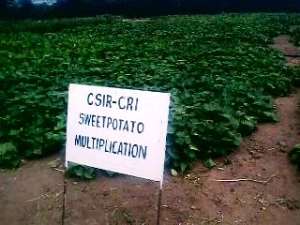
Ghana is presently undertaking confined field trials on four biotechnology crops approved by the National Biosafety Authority.
These include Bt. Cotton, Bt. Cowpea, High Protein Sweet Potato and GM Rice, driven by some institutes under the Council for Scientific and Industrial Research (CSIR).
The field trials are mainly for research and not commercial purposes, explained Dr. Stephen Amoah, research scientist in breeding and molecular biology at the Crops Research Institute (CRI) of the CSIR.
“The Genetically Modified Organisms are governed by the Biosafety Law and at the moment anything that is being done on it is under confinement, so the institutions in Ghana can only do confined field trials and they are non-commercial and not for profit,” he stated.
It is early days yet to ascertain the outcomes of these research activities but the aim is to increase food security and income for farmers. When combined with conventional approaches, biotech can go a long way in the improvement of crop productivity.
According to the National Biosafety Authority, all the four trials are complying with the terms and conditions under the regulations.
“As a regulator, my interest in not in how well the crops are doing, that is the scientists business so when we go out we look at their compliance to the terms and conditions and that I know that they've been 100 percent,” stated Eric Amaning Okoree, a member of the Authority.
Public education and participation forms an integral part of the trials, he noted.
However, skepticism is rife in Ghana introducing genetically modified crops in the country's food chain.
Some researchers would rather expect Ghana to be cautiously optimistic than to be pessimistic on issues of biotechnology.
“A pessimist would say it is not possible, it is dangerous but a cautious person would say that if it is dangerous but still helpful, can we put in place safety guards?” said Daniel Osei Ofosu, Country Coordinator of Program for Biosafety Systems (PBS) Ghana.
PBS is run by the International Food Policy Research Institute (IFPRI) to provide science-based biotechnology analysis to ensure regulations guiding the technology are in place and enforced.
The PBS is assisting regulators and other interest groups in Ghana to instill best practices that ensure human and environmental safety in biotechnology application.
“Currently we are helping build functional systems and helping the Biosafety Authority come out with guidelines to guide scientists as they conduct field trials; we're also helping to educate the general public on the safety measures that need to be put in place or are in place that will ensure that we're all safe with the introduction of biotechnology,” noted Mr. Ofosu.
Story by Kofi Adu Domfeh




 We’ll no longer tolerate your empty, unwarranted attacks – TUC blasts Prof Adei
We’ll no longer tolerate your empty, unwarranted attacks – TUC blasts Prof Adei
 Bawumia donates GHc200,000 to support Madina fire victims
Bawumia donates GHc200,000 to support Madina fire victims
 IMF to disburse US$360million third tranche to Ghana without creditors MoU
IMF to disburse US$360million third tranche to Ghana without creditors MoU
 Truck owner share insights into train collision incident
Truck owner share insights into train collision incident
 Paramount chief of Bassare Traditional Area passes on
Paramount chief of Bassare Traditional Area passes on
 Two teachers in court over alleged illegal possession of BECE papers
Two teachers in court over alleged illegal possession of BECE papers
 Sunyani: Victim allegedly shot by traditional warriors appeals for justice
Sunyani: Victim allegedly shot by traditional warriors appeals for justice
 Mahama vows to scrap teacher licensure exams, review Free SHS policy
Mahama vows to scrap teacher licensure exams, review Free SHS policy
 Government will replace burnt Madina shops with a new three-story, 120-store fac...
Government will replace burnt Madina shops with a new three-story, 120-store fac...
